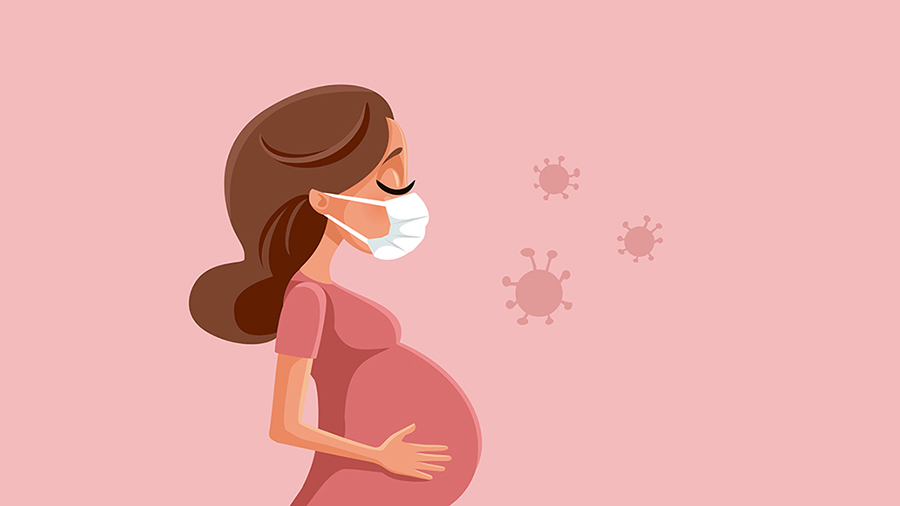COVID-19 & Your Pregnancy
What if I get Covid-19 while I am pregnant?
At this time, very little is known about COVID-19 infection in pregnant women. Most of what is known are based on cases reported from China. The small amount of data collected so far has been reassuring. It indicates that pregnancy does not make you more likely to get COVID-19 nor put you at higher risk for serious illness.
However, other viruses from the same family as COVID-19, such as SARS-COV and the influenza virus (flu) does pose an increased threat in pregnancy. For this reason, the American College of Obstetrics and Gynecology (ACOG) considers pregnant women an at-risk population for COVID-19.
If you do have symptoms of COVID-19:
- Stay home except to get medical care. Avoid public transportation.
- Speak with your health care team over the phone before going to their office.
- Get medical care right away if you feel worse or think it’s an emergency.
- Separate yourself from other people in your home.
- Wear a face mask when you are around other people, and when you go for medical care.
What are the symptoms of COVID-19?
- Fever or chills
- Cough
- Shortness of breath or difficulty breathing
- Fatigue
- Muscle or body aches
- Headache
- New loss of taste or smell
- Sore throat
- Congestion or runny nose
- Nausea or vomiting
- Diarrhea
How can I stay physically healthy right now?
- Eating healthy meals
- Exercising regularly
- Getting plenty of sleep
- Avoiding alcohol and drugs
- Taking every precaution to avoid infection
- wash your hands frequently
- stay at home
- limit travel
How will Covid-19 affect my pregnancy?
Some reports have indicated that pregnant women with COVID-19 have had preterm births. Still, it is not clear whether the preterm births were actually due to COVID-19 infection or other factors. There is no information about COVID-19 and the risk of miscarriage or birth defects. Although high fevers brought on by any infection can increase these risks.
It is also too early for researchers to know how COVID-19 might affect a fetus. We have not seen the virus passed through the placenta to the fetus. In a recent limited review of infants born to mothers infected with COVID-19, no virus was found in the amniotic fluid, and none of the infants tested positive for COVID-19.
Should I wear a face mask if I’m pregnant?
The same criteria for mask-wearing apply to pregnant women as it does in the general population. Wear a mask in public to reduce the risk of unknowingly spreading the virus. You also should wear a mask if you are taking care of someone who has COVID-19 infection or symptoms.
How will COVID-19 affect my prenatal care visits?
As the virus continues to spread, your doctor may adjust your prenatal scheduled visits. You may have fewer in-person visits and instead, speak with your healthcare team by phone or through an online video call (telemedicine). This makes sure that you get the care you need while preventing the spread of disease.
Your doctor’s office will screen you for COVID symptoms or exposure before any in-person visit. You may be contacted before a scheduled appointment (or you should call them) to check if you have symptoms of a respiratory infection (cough, sore throat, fever). If you are exposed or have symptoms, you will be instructed NOT to come to the office for your appointment.
For in-office visits, you may be asked to come to your appointment alone to reduce crowding within the office. Your doctor may also choose to bundle the services you need, such as lab work and ultrasound, to minimize your in-person appointments.
Will the timing or method of my delivery be affected if I have COVID-19?
If you develop a confirmed or suspected case of COVID-19 infection in the third trimester and are asymptomatic or only mildly symptomatic, your doctor may recommend postponing delivery until you test negative. Delaying delivery will reduce the risk of you passing the infection to your baby after birth. In general, COVID-19 infection itself is not a reason for immediate delivery, nor is it a reason for a cesarean section to be performed. However, if you are seriously or critically ill, the recommendations will differ and depend on your clinical situation.
What happens after my delivery?
We do not yet know whether newborns with COVID-19 are at increased risk for severe complications. It is known, however, that newborns infected with influenza virus (flu) are at increased risk for severe complications. After delivery, you can pass COVID-19 to your baby through your respiratory secretions. To reduce this risk, it is recommended that you avoid staying in the same room as your baby. You and your doctor will make this decision based on your symptoms and the severity of your illness.
Most likely, you will not be allowed visitors. Some hospitals are not even allowing anyone to be in the delivery room with you. You will have to check your hospital’s policy. If you are doing well after delivery, your doctor may decide to discharge you early: One day after vaginal birth and two days after cesarean delivery. Early discharge from the hospital will reduce the risk of hospital staff unknowingly passing the infection to you.
How will COVID-19 affect breast-feeding?
In limited studies on women with COVID-19, the virus has not been detected in breast milk, but it is not known whether mothers infected with COVID-19 can transmit the virus to the baby through her breast milk. If you have confirmed or suspected COVID-19 infection, it is critical that all possible precautions be observed in order to avoid spreading the virus to your baby, including:
- Washing your hands before you touch your baby
- Wearing a face mask while nursing (feeding at the breast)
- If you intend to breastfeed, you should express your breast milk to establish and maintain milk supply.
- If you are expressing breast milk with a manual or electric breast pump, you should wash your hands before touching any pump or bottle parts.
- Properly clean your pump after each use
- Consider having someone who isn’t sick feed the expressed breast milk to your baby
- If you choose to room-in and breast-feed, put on a facemask and practice hand hygiene before each feeding.
When can I stop taking these precautions around my baby?
You and your provider make the decision to discontinue precautions that prevent spreading COVID-19 to your baby. You may use either a test-based strategy or a non-test-based strategy.
- In the test-based strategy, you must meet all three criteria:
- No more fever (without the use of fever-reducing medications)
- Improvement in respiratory symptoms
- Negative results from two COVID-19 tests in a row collected ≥24 hours apart
- In the non-test-based strategy, you must meet all three criteria:
- At least three days (72 hours) have passed since your fever stopped (without the use of fever-reducing medications)
- There is an improvement in respiratory symptom
- At least seven days have passed since symptoms first appeared
References
- Latest practice guidance: Advisory on Novel Coronavirus 2019 (COVID-19) including an algorithm to aid in assessment and management of pregnant patients with suspected or confirmed COVID-19. American College of Obstetrics and Gynecology, Novel Coronavirus 2019, Practice Advisory, July 2020
- Centers for Disease Control and Prevention. Interim Clinical Guidance for Management of Patients with Confirmed 2019 Novel Coronavirus (2019-nCoV) Infection, Updated February 12, 2020.
- Centers for Disease Control and Prevention. 2019 Novel coronavirus, Wuhan, China. Information for Healthcare Professionals.
- Centers for Disease Control and Prevention. Interim Clinical Guidance for Management of Patients with Confirmed 2019 Novel Coronavirus (2019-nCoV) Infection, Updated February 12, 2020.
- Li Q, Guan X, Wu P, et al. Early Transmission Dynamics in Wuhan, China, of Novel Coronavirus-Infected Pneumonia. N Engl J Med 2020.
- Perlman S. Another decade, another coronavirus. N Engl J Med 2020; 382:760.
- Report of the WHO-China Joint Mission on Coronavirus DIsease 2019 (COVID-2019). February 16-24, 2020. (Accessed on March 30, 2020).
- What you need to know about COVID-19. Society of Maternal Fetal Medicine podcast featuring Drs. Laura Riley, Brenna Hughes, and Suwan Mehra as they discuss frequently asked questions from MFMs about COVID-19.
- Zhu N, Zhang D, Wang W, et al. A Novel coronavirus from patients with pneumonia in China, 2019. N Engl J Med 2020; 382:727.
ADDITIONAL REFERENCES:


